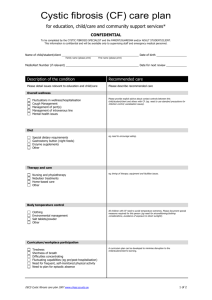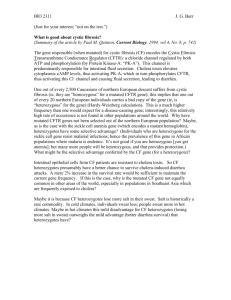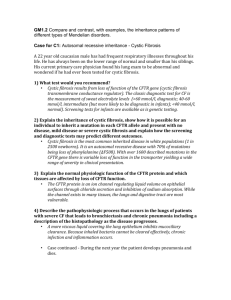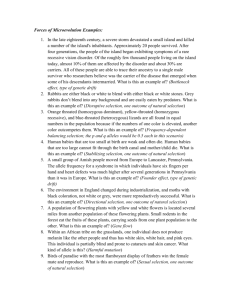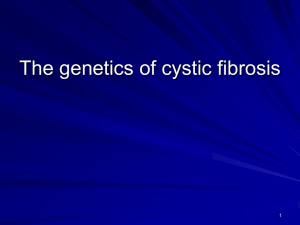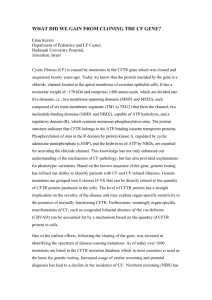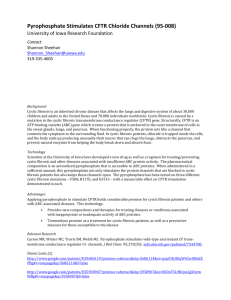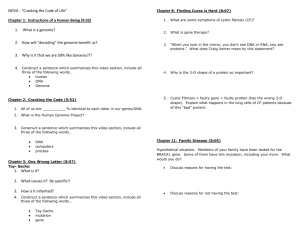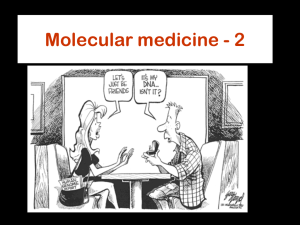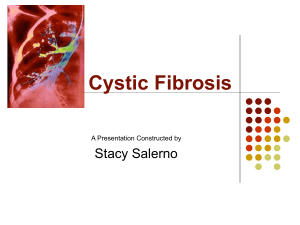Cystic Fibrosis
advertisement
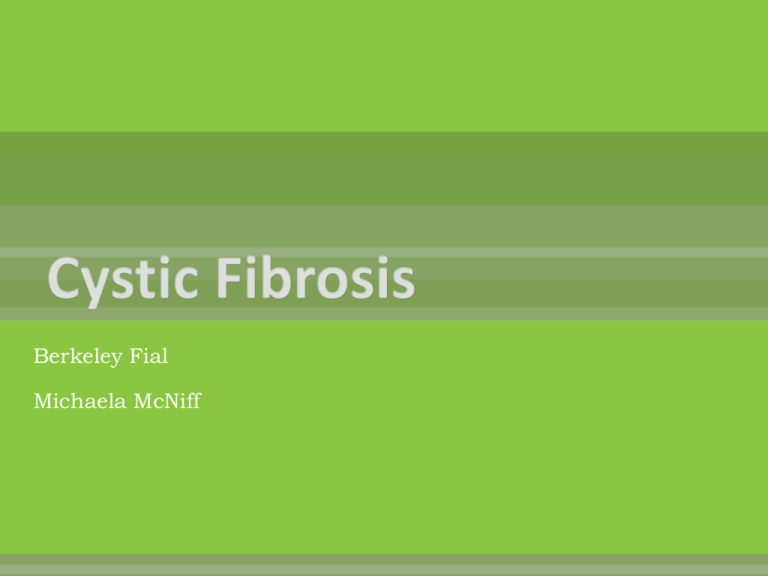
Berkeley Fial Michaela McNiff Someone gets Cystic Fibrosis when they inherit two mutated genes – one from each parent. The CF gene is on chromosome 7. The parents of a child with CF sometimes don’t have CF because they don’t have two mutated copies of the CF gene. Since you need two mutated genes to get this disease it is a recessive disorder. Cystic Fibrosis is an autosomal recessive disease. This is a non-sex linked disease. It is a hereditary disease. “CF is caused by a mutation in the gene, cystic fibrosis transmembrane conductance regulator (CFTR). The product of this gene is a chloride ion channel important in creating sweat, digestive juices, and mucus. Although most people without CF have two working copies (alleles) of the CFTR gene, only one is needed to prevent cystic fibrosis. CF develops when neither allele can produce a functional CFTR protein.” – Wikipedia C - don’t have CF c - has CF Cc is a possible genotype for the parents because they don’t have CF but carry one of the recessive CF genes - c. There a 25% chance that their child will have CF and a 75% chance that they will not have CF. C c C CC Cc c Cc cc “Cystic fibrosis is one of the most common lifeshortening genetic diseases. In the United States, 1 in 4,000 children is born with CF. It is most common among western European populations; one in twentytwo people of Mediterranean descent is a carrier of one gene for CF, making it the most common genetic disease in these populations.”- Wikipedia “The CFTR gene is found at the q31.2 locus of chromosome 7, is 230,000 base pairs long, and creates a protein that is 1,480 amino acids long. The most common mutation, ΔF508 is a deletion (Δ) of three nucleotides that results in a loss of the amino acid phenylalanine (F) at the 508th (508) position on the protein. There are several mechanisms by which these mutations cause problems with the CFTR protein. ΔF508, for instance, creates a protein that does not fold normally and is degraded by the cell.” -Wikipedia If someone with CF has kids there are only 3 possible scenarios to see if their kid will have CF. If one parent has CF their genotype would have to be cc, so they could marry some one with a genotype of CC, Cc or cc. In the case of cc x CC there is no chance that their children will have CF because you need a chromosome from both your parent to get CF. In the case of cc x Cc there is 50% chance that their children will have CF. Lastly with two parents with the genotypes cc there is a 100% chance that their kids will have CF because both the parents must pass on a c. There are three different methods of diagnosing cystic fibrosis. These methods are prenatal screening, Prenatal Screening “If that parent is found to be a carrier of a CFTR gene mutation, the other parent is then tested to calculate the risk that their children will have CF. Testing analyzes the blood for the most common mutations such as ΔF508 — most commercially available tests look for 32 or fewer different mutations. If a family has a known uncommon mutation, specific screening for that mutation can be performed. Because not all known mutations are found on current tests, a negative screen does not guarantee that a child will not have CF.” – Wikipedia Sweat Test “Cystic fibrosis occurs when there is a mutation in the CFTR gene. The protein created by this gene is anchored to the outer membrane of cells in the sweat glands, lungs, pancreas, and other affected organs. The protein spans this membrane and acts as a channel connecting the inner part of the cell (cytoplasm) to the surrounding fluid. In the airway this channel is primarily responsible for controlling the movement of chloride from inside to outside of the cell, however in the sweat ducts it facilitates the movement of chloride from the sweat into the cytoplasm. When the CFTR protein does not work, chloride is trapped inside the cells in the airway and outside in the skin. Because chloride is negatively charged, positively charged ions cross into the cell because they are affected by the electrical attraction of the chloride ions. Sodium is the most common ion in the extracellular space and the combination of sodium and chloride creates the salt, which is lost in high amounts in the sweat of individuals with CF. This lost salt forms the basis for the sweat test” Genetic- By extracting DNA, scientists can read strands of DNA. Certain letter sequences symbolize a gene characteristic for a certain gene. Through this method it is easy to determine if the parent or child have or will have the disease. The disease is sometimes obvious right after birth, but some cases of CF (Cystic Fibrosis) aren’t detected for months. Symptoms include: Pneumonia (frequently) Chronic cough w/ thick mucus Poor growth Abdominal swelling Vomiting Dehydration Malnutrition Poor appetite Difficulty breathing The lifespan of someone with CF is usually between 28 and 30 years of age. The cause of death is usually respiratory tract infections or respiratory distress, along with enlargement of the right side of the heart. There is no cure yet for CF. There are treatments for the symptoms and diseases that come with CF such as treatment for lung and digestive problems. Sometimes lung transplants are made in order to give the patient a new lung with out the infected bacteria with in it. Gene therapy is being used to try and find a cure for the disease. Gene therapy is being done to find a cure for cystic fibrosis. It looks promising, but they aren’t sure how long it will take to actually find a cure. Most patients with cystic fibrosis are diagnosed by age two. Common characteristics of this disease are “very salty-tasting skin; persistent coughing, at times with phlegm; frequent lung infections; wheezing or shortness of breath; poor growth/weight gain in spite of a good appetite; and frequent greasy, bulky stools or difficulty in bowel movements.” – www.cff.org People who carry this disease live into their midforties, on average. This number has increased over the years with the help of technology and medical advances. However, this is still extremely young. Many people still die very young People who have cystic fibrosis are challenged to live a “normal” life. Because of all the symptoms, the patients cannot compete in sports and always need to have extra attention regarding food and health concerns in general. The Cystic Fibrosis Foundation is an organization with a website with all the information you need to know about CF. This is extremely helpful for people with family members that have this diseases to find more information. http://www.cff.org/ Also, Cystic Fibrosis Worldwide is an organization that’s goal is to improve the quality of life and the life expectancy of people with CF. This organization reaches out to other countries by trying to find a treatment and cure for this disease. http://www.cfww.org/about

